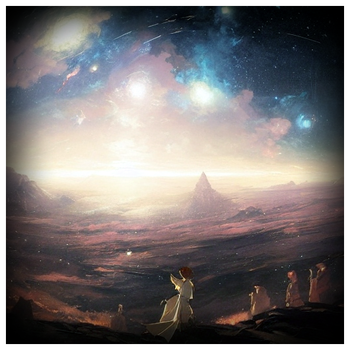
I haven’t published any science fiction other than some things here and there on my blogs, so I wouldn’t say that I’m an expert on writing Science Fiction – but I most certainly would consider myself an expert on reading Science Fiction. And it’s Sunday, and this is what I feel like writing about today.
Presently, there’s an inflection in technology where technology can write like a science fiction author (poorly), however banal one might think it is. There’s a recurring theme right now about people worried about creative endeavors being taken over, but as far as I know nothing very impressive has come out in this regard and I don’t expect it anytime soon.
…There’s one barrier that AI can’t cross, as of now. And that’s creating new science fictional concepts. The writer who can take in everything that’s going on now and speculate about the near future in any coherent way has the edge – for the moment. AIs based on current training models are essentially limited to rearranging the deck chairs on the Carnival Cruise’s Mardi Gras. What’s disappointing, is that’s exactly what most current human science fiction writers are doing too…
“The Future of Science Fiction“, James Wallace Harris, 4/2/23
I fully endorse what he writes there. Most human science fiction writers these days seem to have Ye Olde CookeBooke of Formulaic Books which has been greatly disappointing when I explored bookstores, running my fingers gently across a creative cover of a book to flip it open, glance within, and see… the same formulae.
I’m not saying there isn’t good original science fiction out there. It’s just gotten so hard to find for me. The dwindling number of bookstores no longer seem to hold that many new ideas and thoughts, and Amazon, while convenient, lacks the tactile experience and probably has adversely affected any romantic relationships that blossomed over book choices in line. Don’t worry, I’m sure they’ll eventually create a dating app based on books you’ve purchased through Amazon, regardless of whether you read or understood them.

“We read, frequently if not unknowingly, in search of a mind more original than our own.”
Harold Bloom, How To Read and Why, 2000.
Harold Bloom’s quote has haunted me for at least a decade now, if not longer, because every time I go into a bookstore and see the same depressing stuff on the shelf that seems like corporate pulp fiction, I think that maybe it’s time I write something better. Something not formulaic.
Something that hits like Robert Heinlein’s Stranger in a Strange Land, an oddly poetic work considering how conservative the author was to create such an interestingly liberal book.
I’m starting a new project tomorrow, holding myself to landmarks and deadlines, so I’ve been roving around the Internet and reading up on things like these. The reason I’m writing about it here is because in it’s own way, it’s a system as hinted at here:

…Right now we have more science fiction of all kinds being produced than ever before. That production is going into overdrive with AI. And the percentage of it that’s readable and entertaining is increasing. That’s also part of the problem – there’s too much science fiction – at least for any one work to become widely known. Good science fiction novels have almost become a generic product line, in white boxes with black letter labeling…
“The Future of Science Fiction“, James Wallace Harris, 4/2/23
Anything sustainable in the world of our creation has to be fiscally sustainable. This is what happened with Web 2.0, this is what has happened with publishing in general, and so, it’s happened to the just about everything else.
Saying that there is a lack of originality in Science Fiction is very much like saying that there’s no real originality in modern music. It’s subjective.
As originality decreases, banality increases.
Now here’s the rub. Since bayesian probability, the core of just about every algorithm out there offering you suggestions on everything from Netflix to Facebook, targets the median, the median decides what is original or not.
As the average person experiences more original works, they increasingly see suggestions as banal. Bayesian probability only works based on what has happened.
Beating that system for marketing requires a mix of what people have liked with what is original, all of which are moving targets on a very small asteroid to be hit from a spaceship with really bad targeting.
Roll the dice, I suppose. I’d rather we had an infinite improbability machine.